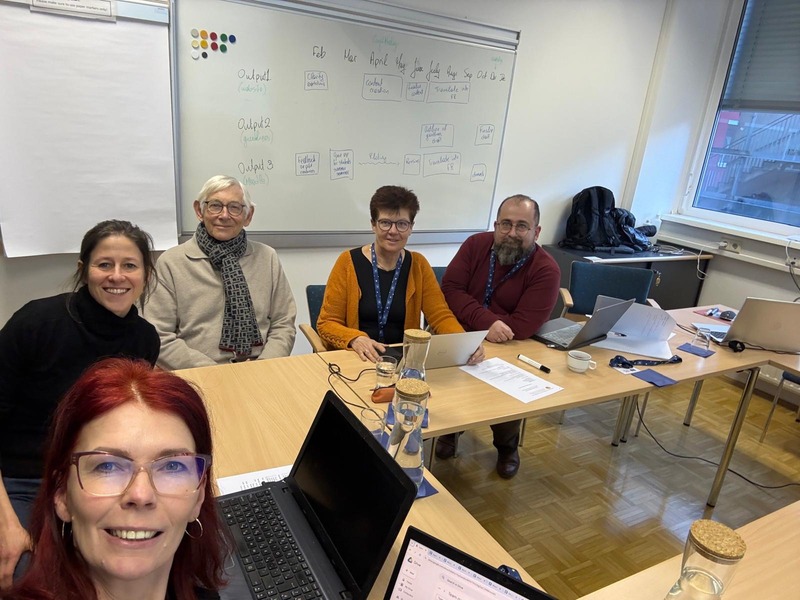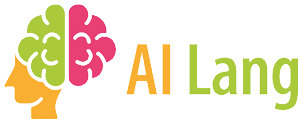Latest news
17.02.2025
Second AI-Lang expert meeting (January 2025)
During the AI Lang team meeting in Graz on 27–28 January 2025 it was decided that Achilleas Kostoulas will take on the project coordination, as Merilyn Meristo will move on to a challenging leadership position in another research project. Also in connection with this restructuring, Aleksandra Ljalikova has been invited to join our team as Communications Officer. We are saddened by the departure of Prof. Meristo, and we are grateful for the leadership and guidance she provided over the last year. Equally, we are delighted to be joined by Prof. Ljalikova, who has impressive experience in using digital tools and AI in language education.
During the meeting, we worked together to refine and improve the structure and envisaged content of our outputs. We expect to have an update on the project website in the coming weeks. Looking ahead into the future, we are preparing to launch a Moodle course that will help teachers and teacher educators integrate AI into their teaching. Also in preparation is a draft set of guidelines for the meaningful and ethical use of AI in language education.
Another development that we are looking forward to is the upcoming workshop, which will bring together AI experts on 25–26 November 2025. We have already laid down important groundwork for preparing the workshop, and we are looking forward to welcoming participants from across Europe to Graz!
Achilleas Kostoulas, project coordinator
• ECML project website “AI for language education” (2024-27) (available in English and French): www.ecml.at/AI-lang
 Do you wish to participate in the workshop?
Do you wish to participate in the workshop?
Individuals with a special interest and professional background in the topic of this particular project are invited to take up contact with the ECML National Nominating Authority in their country so that they can be considered for participation in the corresponding project workshop.


23.01.2025
AI for language education: project developments 2024

Since the beginning of 2024, the AI for language education (AILang) project has been actively engaged in exploring and documenting how language teachers use AI tools to support teaching and learning.
In our kick-off expert meeting, which took place on 18 and 19 March, the project team developed a multilingual questionnaire to map how AI is being used across national settings, what affordances teachers are aware of, and what apprehensions they have regarding the effective and ethical use of AI in language education. This survey has now been completed, and we would like to thank all participants for their time and insights. The initial findings of the survey suggest that AI resources were widely used: over half the respondents reported having used AI tools to create materials, organise lesson plans, teach all language skills and improve students’ vocabulary, grammar and pronunciation. Some examples they provided included:
- generating text for classroom use
- creating comprehension questions for reading or listening exercises
- creating different versions of learning and assessment tasks
- rephrasing instructions (e.g., “This helps me to have a different perspective on what I write”)
- generating images that correspond to a description or text
That said, many teachers reported challenges in prompt generation, finding ways to integrate creativity into AI-assisted language education, and avoiding plagiarism. Concerns were also raised about training and the cost of AI tools. The teachers also reported fears regarding being replaced, or language education becoming obsolete, as well as the perceived decline in students’ production skills.
Based on the findings from this survey, the AILang team is currently working on developing resources that can help educate teachers about AI-assisted language education. To that end, we have been experimenting with various AI resources (e.g., CoPilot, ChatGTP, Claude, DeepL, Diff.it, etc.) and exploring their potential and limitations. Our insights are used to produce teacher education materials that can help to:
- familiarise teachers with AI resources and encourage them to experiment with them
- develop their capacity to meaningfully integrate multiple AI tools into their teaching
- encourage reflection on the pedagogically effective and ethical use of AI technology in language education.
An online learning space has already been created to host these learning resources, and we are currently in the process of populating it with resources.
We also organised an online event for teachers to exchange ideas and good practices regarding the use of AI in their language classrooms. Our first BarCamp event, on 5 November 2024, brought together teachers from Armenia, Denmark, Egypt, Estonia, France, Georgia, Greece, Italy, Morocco, North Macedonia, Serbia and Sweden. In the focused discussions that took place participants shared their insights from the use of AI tools, presented innovative teaching ideas, discussed difficulties they have faced, and received peer feedback on their ideas and practices. We are in the process of analysing the insights from the BarCamp and will follow up with more information about it shortly.
Further ahead, we are also looking forward to our next international workshop, which will take place in Graz in November 2025. This will be an opportunity to present our ongoing work and discuss how it can be made more useful for language educators in diverse settings. If you are interested in participating, you can follow this space (www.ecml.at/AI-lang) for updates, and liaise with the National Nominating Authorities in your country for details.
Despite being launched just this year, the AILang project has already made considerable strides in understanding the current applications of AI in language education. These initial achievements mark only the beginning of the project's broader goals. Looking ahead, AILang is poised to launch new initiatives aimed at empowering educators with AI-driven tools and insights, transforming the future of language learning.
Merilyn Meristo, coordinator of AILang
• ECML project website “AI for language education” (2024-27) (available in English and French) :
www.ecml.at/AI-lang
14.06.2024
A short survey on the use of AI in language teaching
At their launch meeting for the new ECML project “AI for language education” in March 2024 team members agreed on an outline of their first deliverable, an online survey on the use of AI in language teaching. A draft questionnaire to explore teachers’ experience, beliefs and attitudes about AI and its possible role in language teaching has subsequently been piloted in four different countries.
The survey is now open and available in English, Estonian, French, German and Greek.

The AI revolution is upon us! It has begun to have a huge impact on education. Some teachers are excited about the changes ahead, while others may feel more reluctant or even fear the arrival of AI. The aim of the questionnaire is to learn about your professional experience, beliefs and attitudes towards AI and its possible role in language teaching. Thank you for taking the time to share with us your personal views and insights.
English: https://forms.gle/3DET6BJP3HTk6Kx3A
Estonian: https://forms.gle/EtTVmgmg8HtadU1q8
French: https://forms.gle/aixuMNFY7ACtpkPg9
German: https://forms.gle/kGYgjZMZ5MPx87y87
Greek: https://forms.gle/NCP5gnRbcJoeu619A